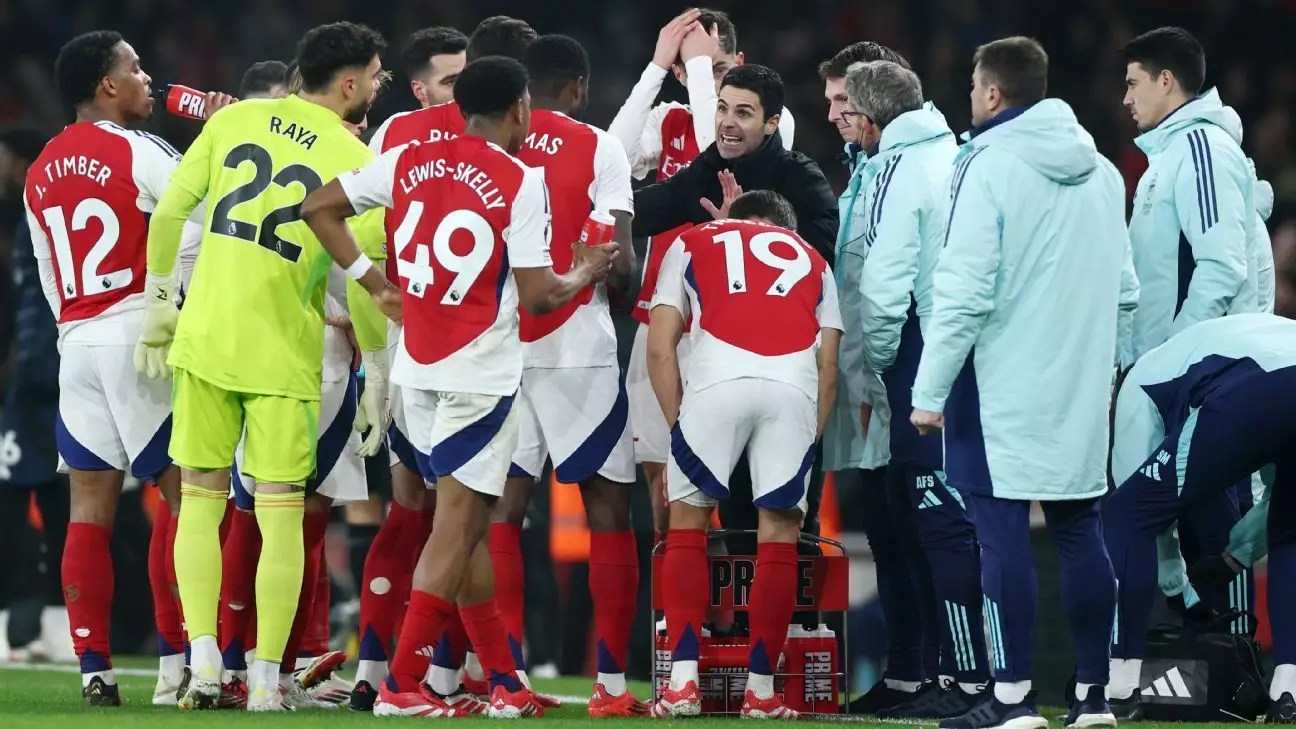In a dramatic Premier League clash that saw Arsenal squander a two-goal lead against Aston Villa, the implications of this result extend far beyond mere points. This match has underscored the urgent need for Arsenal to reassess their squad depth and overall strategy in their pursuit of the elusive title. Despite commanding the game for significant stretches, Arsenal’s failure to maintain their advantage demonstrates a recurring flaw that has plagued them throughout the season.
Arsenal’s bright start, which included an opening goal from Gabriel Martinelli, quickly dulled as Aston Villa capitalized on defensive errors and unfulfilled potential on Arsenal’s part. The cross from Matty Cash that allowed Ollie Watkins to score was emblematic of the defensive lapses that have become all too frequent for the Gunners; moments like these accentuate the urgent desire from fans and analysts alike for managerial changes, as well as a January transfer window splurge.
While Mikel Arteta has made strides in terms of tactical development, what became startlingly clear during the Villa encounter was the stark contrast in depth between Arsenal and their rivals. As Liverpool pushed past Brentford, Coach Arne Slot was able to call upon a bench packed with talent, showcasing fresh and impactful substitutes that changed the game. In stark contrast, Arteta’s options appeared depleted. A loan deal for Raheem Sterling has failed to yield results, and the bench was a mix of youngsters and less tested players. This discrepancy in quality raises fundamental questions about Arsenal’s ambitions and planning.
The crux of Arsenal’s challenges lies not only in their starting XI but also in the lack of proven alternatives when heavy artillery is needed to change the course of a match. The apparent reliance on a few key players speaks volumes about the necessity for reinforcements if Arsenal is genuinely serious about competing at the highest level. Arteta himself indicated the need for a more extensive roster capable of responding effectively to intense game situations.
Injuries have compounded Arsenal’s problems, with key players such as William Saliba, Bukayo Saka, and Gabriel Jesus sidelined. Such absences are evidently detrimental, yet they reveal a deeper flaw in squad management and preparation. The decision to shuffle players—moving Thomas Partey to right-back and Jurriën Timber to center-back—did not bear fruit and ultimately led to a disjointed defensive performance. This situation raises the question: why has the club not prepared adequately for the risks associated with player injuries?
Historically, teams that aim for championships have depth charts that balance experience with raw talent, ensuring that a drop in performance due to injuries doesn’t entirely derail the campaign. Arsenal’s recent encounter emphasizes the need for management to acknowledge this shortcoming. Moreover, Saliba’s past absence affected the team’s defensive stability, showcasing the critical need for a strategic approach to squad rotations and injury management.
Tactically, Arteta’s choices during the match against Villa warrant scrutiny. The inability to adapt effectively during crucial moments in the game once again cast doubt over decision-making at pivotal moments. As seen by the quick succession of Villa’s goals, Arsenal’s defenders were unable to marshal their positions as a cohesive unit. Furthermore, failing to capitalize on vantage points when the match clearly favored them was a missed opportunity that could define their season.
Moreover, the Gunners dropped a concerning twelve points from winning positions throughout the season, signaling deeper systemic issues. Implementing robust training practices focused on maintaining concentration and commitment during all phases of play must be prioritized if Arsenal intends to scale the heights of the Premier League successfully. Each drop in points, particularly at home, chips away at the team’s confidence, and these elements can create a psychological barrier against higher-quality opposition.
The January transfer window is now of paramount importance for Arsenal. Fans and pundits alike are calling out for the club to invest significantly in strategic signings that can bolster both attacking threat and defensive resilience. Arsenal’s Northern rival Liverpool, for example, have proven adept at navigating transfer windows to their advantage, which raises expectations for the Gunners’ leaders to emulate such acumen.
As the club’s hierarchy considers options, it will be crucial to target signings capable of immediately impacting the first team. Whether through experienced players who can perform consistently or emerging talents ready to prove their worth, Arsenal must maximize the quality of their acquisitions to revitalize their campaign. The path to redemption lies in their ability to translate financial resources into tangible performance improvements on the pitch.
Arsenal stands at a crossroads. The recent draw against Aston Villa not only highlights stark deficiencies within the team but also leaves a somber reminder that the current squad, while talented, may not have the depth and tactical versatility required to secure silverware. The urgency to address these weaknesses before the January transfer window closes is palpable, and how the club maneuvers in this crucial period will define their season’s trajectory.


Leave a Reply